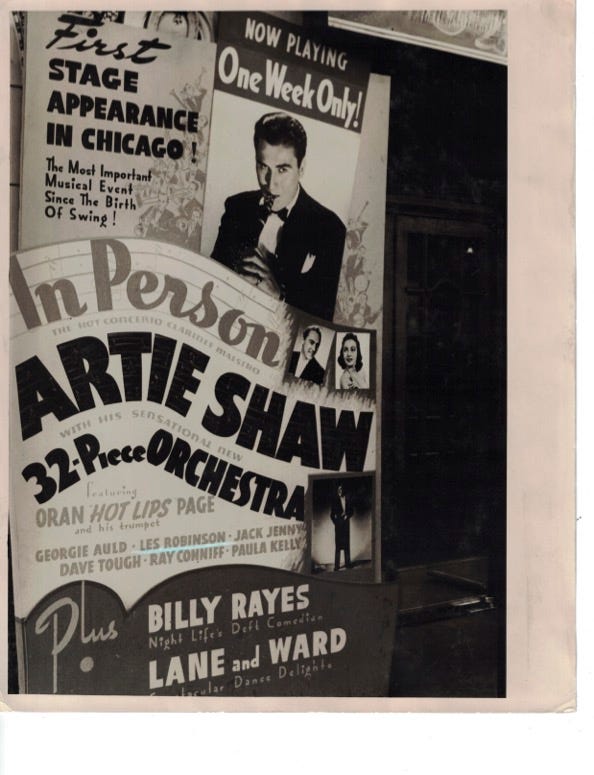Artie Shaw, part 1: "Time is All You've Got"
In Honor of Brigitte Berman's Oscar-winning documentary this weekend at the Film Forum
Confession: I wrote this yesterday for the New York Sun, and filed it, only to learn that the Sun had already run a review by one of our several first-rate film critics. Mario Naves. (You can read that most excellent review here.) Thus, I decided to share my own story here on substack.
Now being in what Mel Tormé would call a “Shavian mood,” tomorrow, as part of the generally Arty feeling for the weekend, I’m going to run a vintage essay I wrote in 1990 as liner notes for a Shaw CD then being released by Sony Music Legacy. Stay tuned!
“Artie Shaw: Time Is All You've Got” (playing at the Film Forum this weekend. On Sunday, January 7, film-maker Brigitte Berman will participate in a Q & A session with Film Forum’s Bruce Goldstein and the New York Sun’s Will Friedwald. For info, click here.)
Artie Shaw was a walking mass of contradictions: he spent the earliest part of his career striving to become a rich and famous musician, and yet at the very moment when he attained the pinnacle of that success, he walked out on it. By the age of 44, he had made himself into the one of the most famous, and not coincidentally, also one of the greatest, clarinet players who ever lived, in any genre of music; but he not only walked out on that as well - permanently this time - but for the rest of his life, he literally bragged about having made his clarinet into a lamp. Even in my own conversations with him, he would state that he had been only interested all along in artistic values - making the best music possible - but then he would turn around (I sometimes even heard him do that in the same sentence) and report on how many records such-and-such a tune had sold.
The great thing about Brigitte Berman’s film Artie Shaw: Time Is All You've Got is that the filmmaker doesn’t shy away from these contradictions, but rather, like her subject himself, embraces them. Considering that Time Is All You've Got is one of the better cinematic profiles of a fundamentally great American musician - it won the Academy Award for Best Documentary Feature - the movie hasn't been seen nearly enough. That’s not least because of the mercurial Shaw himself; he says in the film that he has more money than he knows what to do with, and yet at one point he sued Ms. Berman for a greater share of the profits. Thankfully, the movie is being shown in a restored print this weekend at Film Forum and will, in the future, be more readily viewable.
Time Is All You've Got is perhaps less of a documentary in the formal sense - unlike Ms. Berman’s previous jazz film, Bix: Ain't None of Them Play Like Him Yet (1982) and her later Hugh Hefner: Playboy, Activist and Rebel (2009). The Shaw movie is basically an extended self-portrait with the incredibly articulate - and verbose - central figure himself. Those interviews are supplemented with remarkable footage, including performance clips of Shaw and his Orchestra performing in Hollywood features, like Dancing Co-Ed (1939), Second Chorus (1940) and various Vitaphone shorts, as well as the rather amazing home movies taken by Shaw’s longtime bassist Sid Weiss. (Weiss himself is also a distinctively mustachioed, bespectacled presence in the historical shots).
Ms. Berman also includes a very select few interviews with associates of Artie, just a few musicians, like trumpeters Lee Castle and John Best. One surprise is John Wexley, the screenwriter of Hollywood’s first notable anti-Hitler movie, Confessions of a Nazi Spy (1939), who turns out to be a friend and neighbor of Shaw. As with her “Bix” film, and unlike, say, Ken Burns’s epic Jazz, there are no traditional “talking heads,” no musicalogical or sociological experts or historians; everybody on screen either worked with Shaw or at least knew him well back in the day.
Ms. Berman let Shaw himself do nearly all of the talking, and then judiciously edited the results. Which is a good thing: Mel Tormé, who himself had quite a gift of gab, once recalled a dinner conversation with Artie in which, knowing what was coming, he looked at his watch before and after Artie launched into some topic or other, and then noted that the bandleader went for well over an hour without so much as taking a breath or consuming a bite of food. Finally, when he paused for a drink, Mel started to respond, but Artie immediately interrupted him: “Do you mind if I finish?”
In Ms. Berman’s film, at least, Mel has the chance to say what he wants to say about his friend and former bandleader. Shaw once told me that all the singers in his bands were hired strictly for their looks - essentially musical window dressing - with the exception of Tormé and Helen Forrest, as well as brief collaborations with Billie Holiday and Lena Horne. Both Tormé and Forrest weigh in thoughtfully here.

In the film, Artie talks about Benny Goodman, his onetime rival, and as we would say today, “frenemy.” Artie accuses Goodman of being overly competitive - but not surprisingly, there are many moments when Shaw himself could be extremely competitive. At the height of the big band era, Goodman was crowned “The King of Swing” and Shaw was coronated as “The King of the Clarinet.” (Artie also had a few choice words for Glenn Miller, especially at the point when the trombonist became the most popular bandleader of the era, but that’s another story.)
Befitting a king, Artie had to outdo Henry XIII: the King of the Clarinet actually had eight wives, among them two movie stars. The last Mrs. Shaw, the actress Evelyn Keyes, is heard here, with nothing but good things to say about him, even though they had separated by the time of the interview.
In the end there’s no reconciling these contradictions. Artie told me, and everybody else, that he hated it when he was expected to play the smiling entertainer, a happy musician with a clown-like visage; that’s one area where Benny Goodman felt the same way. And yet they both literally worshipped Louis Armstrong, who felt precisely the opposite, that a performer should always put on a happy face, no matter what. Artie made it a point to distinguish between performers whom he regarded as true “artists” and those who were essentially entertainers–“But Satchmo was so great that he could be both at the same time.” The same thing applies to Artie Shaw himself, whether he liked it or not.
More Artie for art’s sake tomorrow, and then the Film Forum event on Sunday.
In writing this piece today, I somehow stumbled upon three more stories on Artie Shaw that I had written over the years for the Wall Street Journal, but had completely forgotten:
Artie Shaw Centennial Story (May, 2010) (“Pop music’s original rebel”)
Throwing a Party for Artie (March 7, 2013)
‘These Foolish Things: The Decca Years’ Review: Remembering and Regretting Artie Shaw’s Early Retirement (August 28, 2017)
Very Special thanks to the fabulous Ms. Elizabeth Zimmer, for expert proofreading of this page, and scanning for typos, mistakes, and other assorted boo-boos!
Sing! Sing! Sing! : My tagline is, “Celebrating the great jazz - and jazz-adjacent - singers, as well as the composers, lyricists, arrangers, soloists, and sidemen, who help to make them great.”
A production of KSDS heard Saturdays at 10:00 AM Pacific; 1:00PM Eastern.
To listen to KSDS via the internet (current and recent shows are available for streaming.) click here.
The whole series is also listenable on Podbean.com, click here.
SPECIAL ENCORE PERFORMANCES!
December 31: The Early Years 1935-42 hosted by Will Friedwald
January 1: The Columbia Years 1943-’49 hosted by Ken Poston
January 2: The Radio Years: hosted by Chuck Granata
January 3: The Fall and Rise (1950-’54) hosted by Will Friedwald
January 4: Frank and Nelson hosted by Will Friedwald
January 5: The Capitol Years hosted by Loren Schoenberg
January 6: Bonus! Sing! Sing! Sing! Some Frank Conversation with Adam Gopnik
January 7: The Movies: Hosted by Chuck Granata
January 8: The Early Reprise Years 1960-'65 hosted by Loren Schoenberg
January 9:The Concert Years hosted by Ken Poston
January 10: The Rat Pack hosted by Ken Poston
January 11: Inside the Studio hosted by Chuck Granata
January 12: Bonus! In the Wee Small Hours with AJ Lambert (Sinatra’s granddaughter)
January 13: 1965-1974 The Main Event hosted by Will Friedwald
SLOUCHING TOWARDS BIRDLAND is a subStack newsletter by Will Friedwald. The best way to support my work is with a paid subscription, for which I am asking either $5 a month or $50 per year. Thank you for considering. (Thanks as always to Beth Naji & Arlen Schumer for special graphics.) Word up, peace out, go forth and sin no more! (And always remember: “A man is born, but he’s no good no how, without a song.”)
Note to friends: a lot of you respond to my SubStack posts here directly to me via eMail. It’s actually a lot more beneficial to me if you go to the SubStack web page and put your responses down as a “comment.” This helps me “drive traffic” and all that other social media stuff. If you look a tiny bit down from this text, you will see three buttons, one of which is “comment.” Just hit that one, hey. Thanks!







The most elusive and mysterious of the giants of jazz really gets his due here.
I bought These Foolish Things after reading the WSJ review.